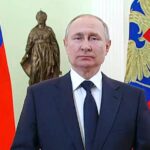In the West, Russian President Vladimir Putin’s ruthless push into Ukraine is often understood in the simple terms of reductionist history: Just another Russian strongman with dreams of expanding the empire.
But surely the images of thousands of peaceful protesters throughout Russia and, indeed, the rest of Eastern and Central Europe, should put to rest the damaging myth of the autocracy-loving-Slav.
To better understand Putin’s campaign demands grappling with his (and, yes, to a great extent, Russia’s) idea of manhood, his constant camera-ready masculinity and its connection to Russia’s gendered narratives about the past.
The pattern of aggressive, masculine, autocratic Russian leaders dates back to the rise of the Romanov dynasty in 1613, the very beginning of the Russian Imperial era of the tsars.
In the early 19th century, Tsar Nicholas I created an autocratic, administrative notion of manhood through his state educational institutions that echoed ideals also valued in the West — from strength to courage to might. But there was a crucial difference — the Russian state inculcated and enforced these values.
While much changed in Russia after the Bolshevik Revolution in 1917, state enforcement of masculinity remained consistent. Some argue that Putin’s hypermasculinity might well connect to pre-Soviet notions of mighty manhood, as well as his obvious embrace of World War II imagery that more than nods to the Stalinesque, as Russian and Soviet flags share space on Moscow’s streets. Putin’s hyper-masculine personae, too, is undoubtedly — and perhaps more toxically — a reaction to everyday Soviet realities, where men rarely lived up to official expectations, leading to a common theme of “failed manhood” in the 1950s and 1960s.
These Soviet, post-war, state-generated discussions around gender included an emphasis on fatherhood — one that few men lived up to, as historian Amy Randall has argued. This failure to create state-mandated gendered personae led to generations of men who carried the burden of their own failed manhood. They were emasculated by women, who ultimately did it all.
Thus, Putin appears to be both a product of his hyper-embracing of Stalinesque WWII imagery and power and a reaction to the failed and emasculated narratives of the post-war era. This is a deadly combination because, using this logic, he must now prove himself and believes he is justified by history in doing so.
The infamous images from 2009 of Putin bare-chested on horseback in Siberia or holding a Kalashnikov for the camera or his legendary days in the KGB are at once familiar and foreign as we think about his recent aggression. And again in 2017, The Washington Post ran a story with updated images of the uber-masculine Putin.
Putin’s hyper-masculinity might be waning as Ukrainians resist, Europeans send weaponry and resources and Russians get dragged off to prison for their defiance back home. One could argue that Putin’s entire campaign is a last-ditch effort to assert a dwindling hyper-masculinity that has been cut off at the knees, year after year, protest after protest — from Pussy Riot, who continue to speak out — onward. Founded in 2011, Pussy Riot began to antagonize Putin and the Orthodox Church in 2012, when they appeared in Moscow’s Cathedral of Christ the Saviour to perform a punk prayer, chock full of obscenities.
Today, as Putin’s hyper-masculinity is thwarted and exposed, Ukrainian President Volodymyr Zelenskyy’s is being touted and celebrated worldwide. Putin now must face the court of public opinion against Zelenskyy, the 44-year old family man who has been dubbed “the hero we need.” Images pervade of his beautiful, happy, young family or his national pride and manly determination to stay. They’ve inspired not only Ukrainian citizens to fight back heroically — as when the citizens of Leningrad held back the Nazis for nearly 900 days — but also the people of Russia and the European Union, the United States, Mexico and beyond.
Zelenskyy, addressing his Russian audience in their native tongue, appealed to them to put down arms and think about whom they are fighting. When the United States offered evacuation, Zelenskyy reportedly replied: “I need ammunition, not a ride.”
This, from one perspective, is a battle between two competing masculinities: the mighty, bare-chested Putin, whose hyper-masculine strength is being challenged, and the kind, gentle, but still strong protector, Zelenskyy. Putin’s hyper-masculine impulses continue to motivate him; therefore he is famously outraged at the notion that he will be backed into a corner.
By looking back at the long history of masculinity among Russian leaders, we can be forewarned about Putin’s unrelenting determination to push forward with this war. It is, in a sense, a matter of fragile masculinity.
Rebecca Friedman is founding director of the Wolfsonian Public Humanities Lab and Associate Professor of History at Florida International University. She is an expert in the cultural and gender history of modern Russia and the Soviet Union and is author of the first English-language monograph on Russian masculinity. Her recent book, “Modernity, Domesticity and Temporality: Time at Home,” explores home life in 20th century Russia.






